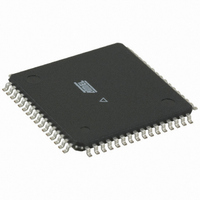ATMEGA645A-AU Atmel, ATMEGA645A-AU Datasheet - Page 245

ATMEGA645A-AU
Manufacturer Part Number
ATMEGA645A-AU
Description
IC MCU AVR 64K FLASH 64TQFP
Manufacturer
Atmel
Series
AVR® ATmegar
Specifications of ATMEGA645A-AU
Core Processor
AVR
Core Size
8-Bit
Speed
16MHz
Connectivity
SPI, UART/USART, USI
Peripherals
Brown-out Detect/Reset, POR, PWM, WDT
Number Of I /o
54
Program Memory Size
64KB (32K x 16)
Program Memory Type
FLASH
Eeprom Size
2K x 8
Ram Size
4K x 8
Voltage - Supply (vcc/vdd)
1.8 V ~ 5.5 V
Data Converters
A/D 8x10b
Oscillator Type
Internal
Operating Temperature
-40°C ~ 85°C
Package / Case
64-TQFP
Processor Series
ATmega
Core
AVR
Data Bus Width
8 bit
Data Ram Size
4 KB
Interface Type
SPI, USART
Maximum Clock Frequency
16 MHz
Number Of Programmable I/os
54
Number Of Timers
3
Operating Supply Voltage
3.3 V
Maximum Operating Temperature
+ 85 C
Mounting Style
SMD/SMT
Minimum Operating Temperature
- 40 C
Operating Temperature Range
- 40 C to + 85 C
Lead Free Status / RoHS Status
Lead free / RoHS Compliant
Available stocks
Company
Part Number
Manufacturer
Quantity
Price
Company:
Part Number:
ATMEGA645A-AUR
Manufacturer:
HONEYWELL
Quantity:
101
- Current page: 245 of 680
- Download datasheet (37Mb)
24.5.2
24.5.3
8285B–AVR–03/11
Scanning the RESET Pin
Scanning the Clock Pins
ATmega165A/165PA/325A/325PA/3250A/3250PA/6
The RESET pin accepts 5V active low logic for standard reset operation, and 12V active high
logic for High Voltage Parallel programming. An observe-only cell as shown in
page 245
Figure 24-5. Observe-only Cell
The AVR devices have many clock options selectable by fuses. These are: Internal RC Oscilla-
tor, External Clock, (High Frequency) Crystal Oscillator, Low-frequency Crystal Oscillator, and
Ceramic Resonator.
Figure 24-6 on page 245
scan chain. The Enable signal is supported with a general Boundary-scan cell, while the Oscilla-
tor/clock output is attached to an observe-only cell. In addition to the main clock, the timer
Oscillator is scanned in the same way. The output from the internal RC Oscillator is not scanned,
as this Oscillator does not have external connections.
Figure 24-6. Boundary-scan Cells for Oscillators and Clock Options
From Digital Logic
is inserted both for the 5V reset signal; RSTT, and the 12V reset signal; RSTHV.
Previous
From
Cell
From System Pin
ShiftDR
0
1
ClockDR
shows how each Oscillator with external connection is supported in the
D
UpdateDR
Q
Next
Cell
To
Previous
D
G
From
Cell
Q
ShiftDR
EXTEST
0
1
0
1
XTAL1/TOSC1
ClockDR
ENABLE
Oscillator
D
FF1
XTAL2/TOSC2
Q
OUTPUT
Next
Cell
To
Previous
From
To System Logic
Cell
ShiftDR
0
1
ClockDR
D
FF1
Q
Next
Cell
To
Figure 24-5 on
To System Logic
245
Related parts for ATMEGA645A-AU
Image
Part Number
Description
Manufacturer
Datasheet
Request
R

Part Number:
Description:
Manufacturer:
Atmel Corporation
Datasheet:

Part Number:
Description:
Manufacturer:
ATMEL Corporation
Datasheet:

Part Number:
Description:
Manufacturer:
ATMEL Corporation
Datasheet:

Part Number:
Description:
IC AVR MCU 64K 16MHZ 5V 64TQFP
Manufacturer:
Atmel
Datasheet:

Part Number:
Description:
IC AVR MCU 64K 16MHZ 5V 64-QFN
Manufacturer:
Atmel
Datasheet:

Part Number:
Description:
IC AVR MCU 64K 16MHZ COM 64-TQFP
Manufacturer:
Atmel
Datasheet:

Part Number:
Description:
IC AVR MCU 64K 16MHZ IND 64-TQFP
Manufacturer:
Atmel
Datasheet:

Part Number:
Description:
IC AVR MCU 64K 16MHZ COM 64-QFN
Manufacturer:
Atmel
Datasheet:

Part Number:
Description:
MCU AVR 64KB FLASH 16MHZ 64TQFP
Manufacturer:
Atmel
Datasheet:

Part Number:
Description:
MCU AVR 64KB FLASH 16MHZ 64QFN
Manufacturer:
Atmel
Datasheet:

Part Number:
Description:
IC AVR MCU 64K 16MHZ IND 64-QFN
Manufacturer:
Atmel
Datasheet:

Part Number:
Description:
IC MCU AVR 64K 5V 16MHZ 64-TQFP
Manufacturer:
Atmel
Datasheet:

Part Number:
Description:
IC MCU AVR 64K 5V 16MHZ 64-QFN
Manufacturer:
Atmel
Datasheet:

Part Number:
Description:
MCU 8-Bit ATmega AVR RISC 64KB Flash 5V 64-Pin TQFP T/R
Manufacturer:
Atmel
Datasheet:











